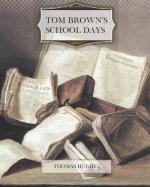The hall was full of boys, and at the head of one of the long tables stood the sporting interest, with a hat before them, in which were the tickets folded up. One of them then began calling out the list of the house. Each boy as his name was called drew a ticket from the hat, and opened it; and most of the bigger boys, after drawing, left the hall directly to go back to their studies or the fifth-form room. The sporting interest had all drawn blanks, and they were sulky accordingly; neither of the favourites had yet been drawn, and it had come down to the upper-fourth. So now, as each small boy came up and drew his ticket, it was seized and opened by Flashman, or some other of the standers-by. But no great favourite is drawn until it comes to the Tadpole’s turn, and he shuffles up and draws, and tries to make off, but is caught, and his ticket is opened like the rest.
“Here you are! Wanderer—the third favourite!” shouts the opener.
“I say, just give me my ticket, please,” remonstrates Tadpole.
“Hullo! don’t be in a hurry,” breaks in Flashman; “what’ll you sell Wanderer for now?”
“I don’t want to sell,” rejoins Tadpole.
“Oh, don’t you! Now listen, you young fool: you don’t know anything about it; the horse is no use to you. He won’t win, but I want him as a hedge. Now, I’ll give you half a crown for him.” Tadpole holds out, but between threats and cajoleries at length sells half for one shilling and sixpence—about a fifth of its fair market value; however, he is glad to realize anything, and, as he wisely remarks, “Wanderer mayn’t win, and the tizzy is safe anyhow.”
East presently comes up and draws a blank. Soon after comes Tom’s turn. His ticket, like the others, is seized and opened. “Here you are then,” shouts the opener, holding it up—“Harkaway!—By Jove, Flashey, your young friend’s in luck.”
“Give me the ticket,” says Flashman, with an oath, leaning across the table with open hand and his face black with rage.
“Wouldn’t you like it?” replies the opener, not a bad fellow at the bottom, and no admirer of Flashman. “Here, Brown, catch hold.” And he hands the ticket to Tom, who pockets it. Whereupon Flashman makes for the door at once, that Tom and the ticket may not escape, and there keeps watch until the drawing is over and all the boys are gone, except the sporting set of five or six, who stay to compare books, make bets, and so on; Tom, who doesn’t choose to move while Flashman is at the door; and East, who stays by his friend, anticipating trouble. The sporting set now gathered round Tom. Public opinion wouldn’t allow them actually to rob him of his ticket, but any humbug or intimidation by which he could be driven to sell the whole or part at an undervalue was lawful.
“Now, young Brown, come, what’ll you sell me Harkaway for? I hear he isn’t going to start. I’ll give you five shillings for him,” begins the boy who had opened the ticket. Tom, remembering his good deed, and moreover in his forlorn state wishing to make a friend, is about to accept the offer, when another cries out, “I’ll give you seven shillings.” Tom hesitated and looked from one to the other.




